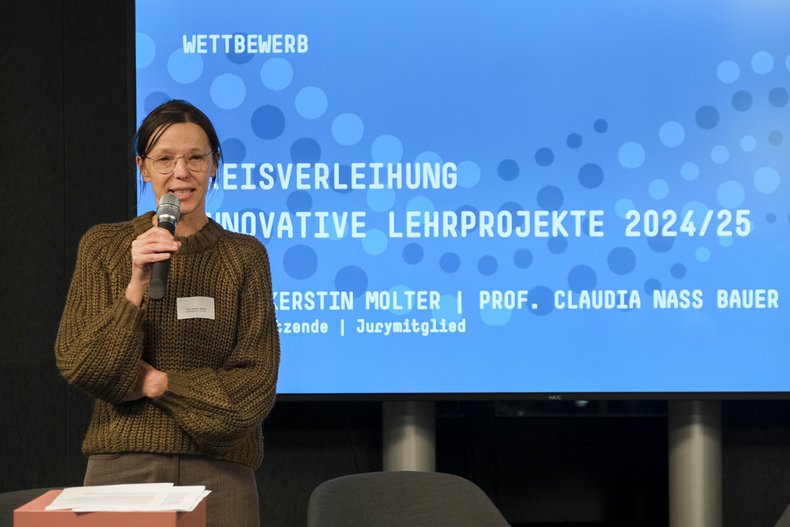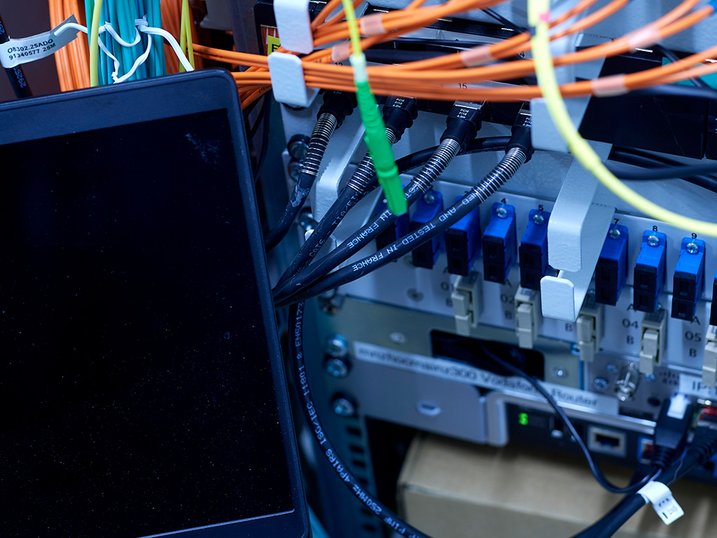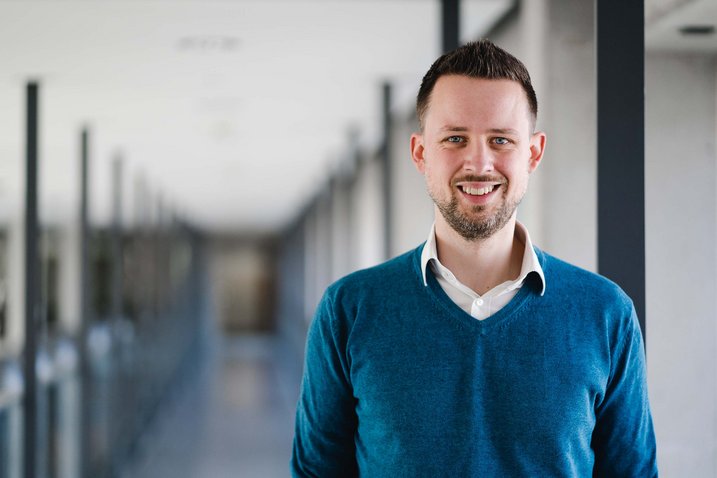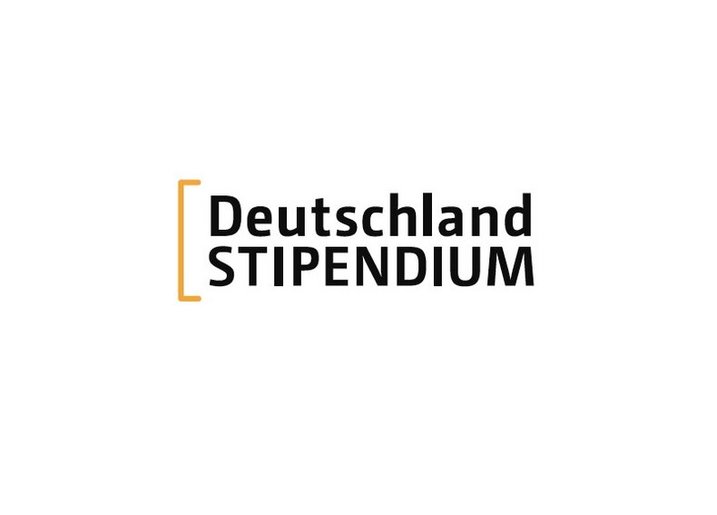Mainz University of Applied Sciences supports educators who test new approaches to university teaching through innovative teaching projects. For the 2024/2025 funding round, 18 lecturers or teams submitted project proposals with a requested total volume of almost 141,000 Euro.
The panel of judges, consisting of student members Sarah Wagner (School of Design), Victoria Stomski (School of Business), and Max Kohlmann (School of Engineering), Professors Dr.-Ing. Katharina Kluge, Claudia Nass Bauer, and Professor Dr. Bernhard Ostheimer, and a staff member of the Competence Center, Annemarie Freudenberg, was chaired by Vice President, Studies and Teaching, Prof. Kerstin Molter.
After an intensive two-day evaluation process, eight projects particularly impressed the judges, and were announced at LEHRimpuls 2024 on December 5, 2024. These projects will be supported with a total funding volume of 61,516 Euro. The funded projects will be presented to the public at an event in the LUX Pavilion in the 2025 summer semester.
The Mainz Kitchen: Prototype Design
Project management | Prof. Dr. Marta Pelegrin, School of Engineering, Department of Architecture
The project The Mainz Kitchen: Prototype Design examines the room model of the social and communal kitchen in interdisciplinary teams. Students develop analog and digital prototypes that are sustainably implemented based on the principles of upcycling, reuse, and D.I.Y. (do it yourself). The aim is to compare a design concept with the built reality. Students acquire skills in digital and analog design and the sustainable use of materials. They practice interdisciplinary collaboration and take on a socially relevant task by researching and implementing new approaches in sustainable design.
Europe, your borders and boundaries
Project management | Prof. Iris-Susan Fäth, School of Design, Department of Interior Architecture
Design students from Mainz, Dijon, and Valencia tackle current European issues, including migration, economic crises, and climate targets. They will present their work, the results of intensive creative and theoretical exploration, in an exhibition at the LUX Pavillion. A follow-up project building on this will be launched, involving in-depth collaboration between students from Mainz and Dijon to artistically address European political hot topics. Guest lectures, digital workshops, and a joint three-day final workshop in person are planned. The project promotes interdisciplinary work, combines artistic and political approaches, and raises participants’ awareness of current European challenges.
Cyber Fimpact – Financial Impact of Cyber Attacks
Project management | Prof. Dr. Markus Nauroth, School of Business, Department of Information Systems and Applied Informatics
The Cyber Fimpact project analyzes the financial impact of cyber attacks on companies and develops a model for assessing these risks. Working with students from Mainz University of Applied Sciences and Southern Illinois University Edwardsville (SIUE), criteria such as the degree of digitalization and the type of attacks are examined. This collaboration promotes both business and IT-specific skills. Digital tools facilitate communication and the modeling of proposed solutions. The results are intended to provide not only theoretical benefits, but also practical insights into IT security measures and financial risk assessment. The project ends with presentations at international conferences and publication in specialized journals.
Prompt Engineering for Managers
Project management | Andreas Wunder & Jonas Fränzl, School of Business, Department of Management
This mandatory elective module prepares students at Mainz University of Applied Sciences to effectively use generative artificial intelligence (genAI) in management. They learn how prompting techniques can be used to efficiently control language models (LLMs) and integrate AI solutions into business processes. By using actual business use cases in collaboration with industry partners, we ensure that the content we teach has maximum practical relevance. By using low-code tools such as Dify, students can directly apply theoretical principles to specific problems. The aim is to provide students with interdisciplinary skills needed to work in highly digitalized environments and to prepare them for the challenges of modern management tasks.
Venturing into the unknown: 40,000 years of migration history
Project management | Prof. Anja Soeder & Prof. Anna-Lisa Schönecker, School of Design, Departments of Interior Architecture & Communication Design
Students of interior architecture and communication design at Mainz University of Applied Sciences collaborate with archaeology students from Johannes Gutenberg University Mainz to communicate scientific content in an innovative way. The exhibition, which was defined as the project objective, addresses the reasons, types, and consequences of migration and connects historical facts with current social issues. Following its first presentation at the LUX Pavillion, the exhibition will be shown at other locations that are freely accessible to the public. Participative activities invite the public to actively engage with the topics. Students learn how to prepare scientific content for different target groups and develop innovative, immersive formats.
Interactive Objects
Project management | Prof. Bernd Benninghoff & Prof. Holger Reckter, School of Design, Departments of Interior Architecture, Communication Design, and Time-Based Media
The Interactive Objects project combines the disciplines of product design, interior design, and media informatics in an innovative teaching format that spans two semesters. The aim is to develop interactive furniture and room modules that promote social interaction using intuitive controls and digital components. Students work closely with local skilled trades businesses to strengthen the link between theory and practice. The focus is on sustainable materials and ergonomic concepts. Prototypes are developed in the first semester, which are then refined with regard to sustainability and functionality. The results will be presented at the LUX Pavillion.
Orbit of possibilities: Practical projects and digital methods
Project management | Dr. Franziska Klemstein, School of Engineering, Departments of Applied Informatics and Geodesy
The Orbit of Possibilities project offers students practical insights into event planning and the use of digital methods in the humanities and cultural sciences. The aim of the project is to apply teaching content such as project management and scientific communication in practice. The students organize an exhibition with interactive exhibits, which are implemented with Raspberry Pi computers, and round it off with an evening event. In the process, they learn how to use digital tools and plan complex projects. The project concludes with an exhibition at the LUX Pavillion and an event making the experiences and results accessible to the public.
Repair – Circular building in collaboration
Project management | Katharina Kasinger & Prof. Gero Quasten, Schools of Design and Engineering, Departments of Interior Architecture and Architecture
The project Repair – Circular building in collaboration focuses on sustainability and the circular economy. In interdisciplinary teams, students develop innovative concepts that integrate existing resources into new, circular-capable designs. The work process is divided into five phases: material research, material extraction, life cycle assessment, planning, and execution. The aim is to combine creative solutions with scientific methods to achieve practical and sustainable results. The project prepares students for their active role in a climate-resilient and digitally transformed world while simultaneously promoting skills in teamwork, material utilization, and participatory work.




